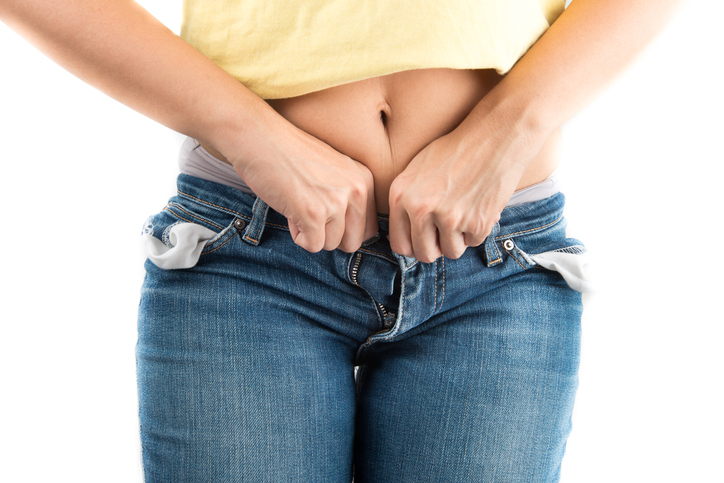Tips To Reduce Bloating
Bloating is sadly all too common at menopause, but there are more reasons for it than you might think.

We all know that feeling, your tummy gets distended and you feel uncomfortable and sometimes in real pain.
There can be a number of reasons: you ate too much, or too fast, or the wrong type of food.
Those that have too much salt, fat, or sugar as that causes gas, weight gain, constipation, or water retention.
Certain medical conditions like celiac disease, Crohn’s disease, irritable bowel syndrome, or ulcerative colitis might also make it more likely.
However at menopause your hormone balance is also a factor so bear that in mind as you check out these other possible causes.
Foods that cause gas
We all know the joke about baked beans and camping and certainly beans are a great source of fibre and protein.
However they also have a substance called raffinose that bacteria need to break down. That can produce gas and lead to bloating but how much will vary from person to person.
It is also dependent on the types of beans, and also broccoli, cabbage, and Brussels sprouts also have raffinose.
Your body will likely adjust, but take it easy and try not to have all those items in any one meal!.
Find the FODMAPs
These are a group of carbohydraes that are hard to digest for some people. The initials stands for fermentable oligo-, di-, mono-saccharides and polyols and they can cause bloating from gas and fluid buildup.
FODMAPs include lactose in dairy, fructose in fruit and honey, and many others.
Wheat, garlic, onions, fruit and vegetables including asparagus, cauliflower, leeks and mushrooms are all high in FODMAPs so again keep to a minimum.
Fruit can also trigger this so recommended no more than 1 portion a day if you are sensitive to bloating.
Keep notes on how your body handles different foods so you can design your own diet to minimise bloating.
Slow down!
The faster you eat, the more air you swallow. Your stomach can swell when it traps the air, which sometimes passes on to your intestines.
Plus, you down more food when you eat quickly. That’s in part because it can take as much as 30 minutes for your stomach to tell your brain that you’re full.
You might overdo it before your brain gets the message — and that can also make you feel bloated.
Reduce the fizz factor
Limit fizzy drinks. The gas that you swallow when you drink bubbly drinks — beer, champagne, soft fizzy drinks — can fill up your digestive system.
You burp some of it away, and some remains and moves through your digestive system until it “passes” out the other end. That’s why it’s called “passing gas.”
Keep carbohydrates under control
Your body taps into this fuel more quickly than protein or fat, which take longer to digest.
After your body uses the carbs it needs for energy, it stores the rest: first as glycogen, which makes your body retain water, and then in fat cells. Both can make you feel bloated.
It can help to avoid “simple” carbs, like white bread and pastries, in favour of “complex” carbs, like whole grains and vegetables that take longer to digest.
Eat just enough
Your stomach is only about the size of a fist. Food reduces through the digestive process, but if you eat too much, it starts to stretch out your stomach, and that can make you feel bloated.
Plus, too much food makes it more likely that you’ll overdo the salt, carbohydrates, fat, and calories, all of which can also make you feel bloated.
Limit salt
Your body needs it to work, but most of us get more than we need. It prompts your body to retain more water, which can make you feel bloated.
It also can cause kidney problems and high blood pressure. You may get more salt in your diet than you realize from processed and fast foods.
So check food labels for salt (sodium) levels and remember that just because you don’t taste it, it doesn’t mean it’s not there.
Constipated?
When you get “stopped up,” you can feel bloated. Mostly, it happens when you need water, fibre, or exercise.
But diet changes, illness, or stress also can do it. It usually passes, but exercise, water, and remedies such as Senna, more fibre and probiotics can all help.
PLEASE NOTE: If it lasts more than a week or two and you’re losing weight and don’t know why, then see your doctor. Particularly if you also have dizziness, stomach pain, or blood in your stool. These could be signs of something more serious.
Check your weight
Have you gained 10 or more pounds in the last year? That’s often the case for people who say they feel bloated.
It could be because that weight often goes on around the belly, which leaves less room for your stomach to stretch.
Check your diet and hormone balance plays a balance here too as women tend to put on weight round the stomach at menopause.
Check your fat intake
Your body takes quite a while to digest fat. That means it can stick around in your stomach for a while and leave you feeling bloated.
Plus, it’s the most calorie-dense food that you can eat. Those calories can add up quickly and cause you to gain weight, which could also make you feel bloated.
Medical conditions
Certain gut conditions like irritable bowel syndrome, Crohn’s disease, ulcerative colitis, celiac disease, infection, or others may be causing your bloating.
Always check this with your doctor and you can help yourself by having good sleep, exercise and an appropriate diet.
Helpful information:
Weight gain and bloating are very common at menopause and often related to poor hormone balance and oestrogen dominance.
Check your symptoms and see if they could be helped with bioidentical progesterone which acts as a natural diuretic to help with bloating and weight loss.
https://anna.blog.wellsprings-health.com/20-foods-and-drinks-that-help-with-bloating/

















